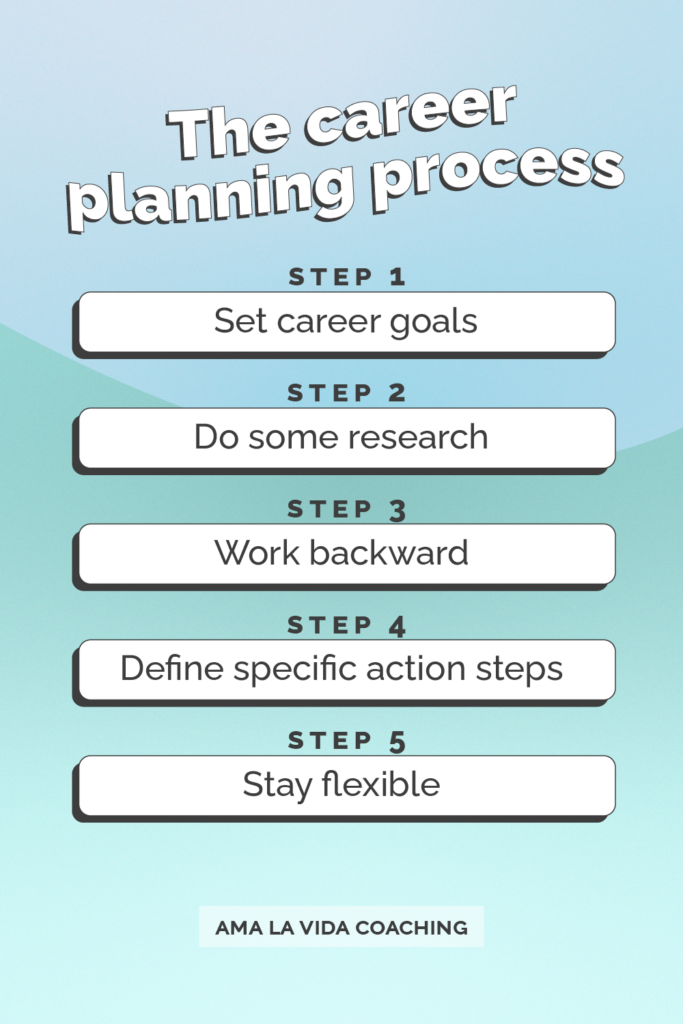How to Map a Clear Career Plan

Creating a fulfilling career requires more than just a day-to-day approach. In this blog post, we’ll dive into the practical aspects of crafting a clear career plan. By envisioning where you want to be in five years and establishing long-term goals, career planning becomes a tool that directs your path to professional fulfillment.
What is a career plan?
A career plan is a strategic roadmap that guides your professional journey from aspirations to reality. Think of it as a practical approach to understanding yourself and the opportunities around you.

Why do I need a career plan?
As we delve into this exploration, two key reasons emerge, shedding light on the significance of thoughtful career planning. From navigating the complexities of making decisions to the pursuit of the most aligned job, the answers lie in creating a life that resonates with our unique definition of success and strategically setting ourselves up for long-term career goals.
Create a job that aligns with your definition of success
If you’re going to spend ⅓ of your life doing something, you might as well make it something you’re interested in!
Investing time and effort into a career plan helps you to consciously mold a career that aligns with your own personal definition of success. This involves a deep dive into your values and interests, ensuring that the choices you make are driven by genuine passion rather than external expectations.

Your career plan is about being actively interested in what motivates you, and crucially, not solely relying on well-meaning advice from family members or friends. To craft a fulfilling career, you must chart a course based on your unique compass, steering clear of external pressures and embracing a path that authentically represents your aspirations.
Set yourself up for long-term career goals
Most people only think about career planning when they’re already actively looking for a new job, yet it is having a strong strategic foundation that offers you long-term success. Whether defining a specific career path, contemplating further education through graduate school, or deciding the next course of action, a well-thought-out plan is indispensable. By deciding thoughtfully today, you can pave the way for a successful and fulfilling professional future.
When to start the career planning process
It’s never too late
When it comes to intentional career development, the notion that it’s never too late to start exploring is a liberating idea. Career planning is not a rigid framework; instead, it’s an adaptable concept that accommodates individuals at any juncture of their professional lives.

Whether you find yourself contemplating a change in career field or transitioning into a new phase of your career altogether, the key is to begin the process of exploration.
By exploring career options, you open yourself to a myriad of possibilities and ideas, which can give you a sense of empowerment and control over your career trajectory.
It’s about acknowledging that the journey is ongoing, and every moment presents an opportunity to initiate change and set a new course towards a more fulfilling professional life.
It’s never too early
On the flip side, recognizing that it’s never too early to begin the career planning process is crucial, especially for those stepping into the workforce or considering entry-level positions. Starting to formulate and complete initial career plans at this stage is a proactive move.
While the early phase of a career might seem like an exploration in itself, having a clear vision and pursuing defined goals can significantly impact long-term success.
By initiating your career planning early on, students and entry-level workers can proactively shape their career paths, ensuring that each step aligns with their aspirations.
Whether you’re pursuing a specific career field or actively pursuing opportunities, the key is to begin developing a career plan, laying the foundation for a resilient and purpose-driven professional journey.
One example would be strategically planning your extracurricular activities or choosing a focus for the courses you take in school. If you already have an idea of the position or jobs you’re targeting, it can help you achieve your goals much faster.
The career planning process
While there are various ways to approach creating a career plan, a structured method provides a solid foundation to begin the process.

Step 1: Set career goals
Embarking on your career planning journey begins with a critical first step: setting clear and meaningful career goals.
Here are a few reflection questions you can use to develop some clear career planning goals:

- What specific achievements do you aim to accomplish in the next six months to a year? Reflect on your short-term goals and how they align with your overall career trajectory.
- Envision your career in the next five to ten years. What are your broader aspirations and interests? Consider the skills you want to develop, the roles or job title you aim to hold, and the impact you wish to make in your chosen field. Don’t shy away from imagining your dream job!
- How do your long-term career goals contribute to your sense of purpose? What are some of your core values that you hold for yourself? Reflect on how having a clear direction can provide motivation and fulfillment, and ultimately guide your decision-making throughout your professional journey.
Setting these career goals not only establishes a roadmap for your immediate actions but also lays the foundation for a purpose-driven and fulfilling long-term path. By answering these reflection questions, you can gain a deeper understanding of your aspirations and set goals that resonate with your values, interests, and ambitions.
Step 2: Do some research
Now that you have a clearer vision, it’s time to delve into the realm of research for some career exploration. There are many ways you can start researching what opportunities might be a good fit for you based on your goals, but here are a few of our favorites:

Online resources and websites:
There are so many wonderful resources online to help you easily understand what different career paths can involve.
- Explore career-oriented websites, job boards, and professional networking platforms. Websites like LinkedIn or Glassdoor can provide valuable insights from actual employees into various industries, employers, job roles, and company cultures.
- Visit industry-specific websites and forums to understand trends, challenges, and opportunities in your chosen field.

Networking and informational interviews:
Once you’ve narrowed down some of your career options that interest you, you can dig a little deeper by talking to people with more experience in those roles or companies to help you decide which ones you’d like to pursue.
- Reach out to employees at companies that interest you to hear about their experience, or talk to your peers in other roles within your current job.
- Conduct informational interviews to gain firsthand knowledge about their career paths, daily responsibilities, and the skills required. You can learn more about how to do these right here.
- Develop your professional network in your desired field through networking events, online platforms, or professional associations.
- Attend career fairs, workshops, and industry conferences to meet professionals and learn more about different sectors.
Educational and training programs:
Not all careers require additional education, but developing new skills can be a wonderful way to expand your career options and even improve your personal fulfillment at work.
- Research certification programs and training courses related to your target career.
- Consider enrolling in free or paid workshops, online courses, or formal degree programs to enhance your knowledge and skills.
- Companies often offer learning and development stipends to their employees as well. Use this AI-based tool to draft a letter to your employer requesting professional development funding.

Remember, the key is to gather a diverse range of information from multiple sources. This will enable you to make well-informed decisions about your career path, aligning your skills and interests with the demands of the job market.
Step 3: Work backward
Once you have some goals and ideas running around in your head, you may start to feel the pressure to do it all NOW. Take a deep breath…not everything has to happen right away (sometimes, it literally can’t!).
A great strategy to organize all your research is to work backward from a future date, whether it be one, five, or ten years down the line.
By setting a clear destination in the future to complete each step, you create a tangible path toward your aspirations.
Make sure to be specific about timeframes for the milestones you want to achieve. For example, what do you want to accomplish within six months or the broader vision for the next five years?
The primary focus with this step is to develop a comprehensive action plan, outlining specific steps to reach your goals.
When you have a defined endpoint in mind, breaking down the journey into actionable steps becomes more accessible. Starting with the first crucial step, each subsequent action builds on the previous one, contributing to your overall progress. The process acts as a roadmap, offering a clear understanding of the route ahead.
By envisioning your future and then strategically plotting the steps in reverse order, you gain a sense of control and direction over your career. This method encourages you to make informed decision-making and empowers you to make necessary adjustments as you progress.
Step 4: Define specific action steps
Once you’ve blocked out an action plan, you can take it one step further and identify more specific action steps.
Begin by setting concrete objectives that align with your overarching goals. These objectives act as the building blocks of your career plan, providing a practical roadmap for your journey.
To make these objectives more manageable, consider breaking them down into 1-3 specific ways you might achieve each one. These can also be viewed as potential milestones along your career path. Assign each milestone a deadline, creating a structured timeline for your progress. This strategic approach ensures that you stay accountable to the bigger goal as you diligently work towards it.
For example, this might be benchmarks for when you will complete a training, gain a new skill, or meet someone who works at a company you’re interested in.
By breaking down your objectives into smaller, achievable components, you gain a granular view of your path to success. This method not only enhances clarity but also facilitates a more realistic and manageable approach to your professional journey.
Step 5: Flexibility within a framework
In all this strategic planning, make sure that the plan never becomes your enemy. Your career plan is meant to help you move forward from a specific moment in time, but it’s not meant to stay the same forever without the capacity to change.

Recognize the importance of flexibility within your career plan. While having a framework is crucial, stay open to the possibility of your opinions, interests, and skills changing as you grow, as well as to new opportunities you may not even be aware of yet!
Your career options are diverse, and being adaptable allows you to seize unexpected opportunities. You never know when a new position may come available, a company you’d never heard of reaches out, or you uncover skills and interests you never knew you had.
Invite a mindset that embraces change so you can explore your multitudes and have fun while you do it!
Some additional tips to help build your career plan
If you’re wanting to give your career planning an extra boost, here are some ideas to help you get started:
- Work with a career coach: Collaborating with a career coach provides personalized guidance, helping you refine your goals and navigate the complexities of your professional journey. At Ama La Vida, we have 60+ career coaches on staff who can help you get started. Click here to set up a free consultation and get matched with one of our personally-selected coaches.
- Optimize your job search: Strategize your job search by aligning it with the goals outlined in your career plan.
- Enhance your resume: Work on optimizing your resume to reflect your skills and achievements, ensuring it tells the story for the career you want to create.
- Regularly update your plan: Career goals evolve, and so should your plan. Regularly revisit and update it to stay aligned with your aspirations and adapt to market dynamics.
Crafting a clear career plan is not just about envisioning the future, but actively shaping it. By setting meaningful goals, conducting thorough research, and working backward from your envisioned future, you lay a solid foundation for a purpose-driven professional journey. Embrace change, stay open to opportunities, and enjoy the evolving process of building a fulfilling and resilient career.








